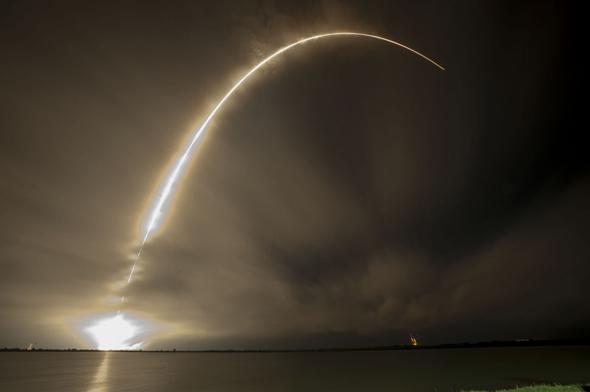Hey, remember Sen. Richard Shelby (R-Ala.), the guy who threw needless layers of bureaucracy at SpaceX because the private space company was doing its job of launching rockets into space a little too well? Well, it looks like he’s being joined by gentlemen from the other side of the Capitol: Three congressmen are trying to do the same thing.
Here’s the deal: SpaceX, as you may know, is making good on its promise to make access to space cheaper and more reliable. Their Falcon 9 rocket is putting payloads into orbit for less money than the big government contractors charge.
As one might expect, government officials who have such contractors in their own districts and states are unhappy with this. And apparently some are willing to smear SpaceX as retribution.
Three House members—Mike Coffman (R-Colo.), Mo Brooks (R-Ala.), and Cory Gardner (R-Colo.)—have sent a memo to NASA demanding that the agency investigate what they call “an epidemic of anomalies” with SpaceX missions.
This is ridiculous for many reasons. For example, the congressmen say that SpaceX should be accountable to the American taxpayer, but in fact as a contractor the rules are different for them than they would be if NASA themselves built the rockets, just as the rules are for Boeing or any other contractor. In fact, as reported by Space News, NASA didn’t actually pay for the development of the Falcon 9; Elon Musk did.
Another reason this is silly is that every rocket ever made has undergone problems; they are fiendishly complex machines and no design has ever gotten from the drafting board to the launch pad without issues. Sure, SpaceX has experienced launch delays and other problems, but the critical thing to remember is that those problems are noted, assessed, and fixed … sometimes within hours or minutes. I remember a LIDAR issue in 2012 that prevented a SpaceX Dragon capsule from berthing to the ISS; the issue was examined and fixed so rapidly I was stunned. “Anomalies” are inevitable; what’s important is if the lessons were learned, and the mission was successful. If SpaceX were suffering more than the usual number of problems that would be worth investigating, but that’s not the case here.
The congressmen’s complaint that SpaceX is behind schedule smells like a red herring to me as well; every new rocket has suffered delays. Of course, NASA’s Space Launch System—a next generation rocket that is supposed to replace the Shuttle—is suffering delays of its own. Full disclosure: I’m not a big fan of SLS. And it’s clear SpaceX is catching up, and is set to leapfrog ahead with new tech, like the Dragon V2 and the Falcon Heavy (the latter is due for its first launch next year—compare that with SLS, which won’t have its first test launch until at least 2017, and a crewed launch in 2021).
That’s why this whole thing looks to me to be a transparent attempt from members of our Congress to hinder a privately owned company that threatens their own interests. I’ll note that Boeing (the major SLS contractor) has a big plant in Alabama, Brooks’ (and Shelby’s) home state, and United Launch Alliance has its HQ in Colorado, home to Gardner and Coffman (it’s even in Coffman’s district). This sounds more like they’re trying to protect their own turf more than honestly wanting transparency from SpaceX.
What’s ironic is I write this not long after a successful SpaceX Falcon 9 launch. In fact, that launch was delayed just before it went up due to a problem in the first stage hydraulics. The important bit? The folks at SpaceX quickly resolved the issue and were able to get the rocket launched just hours later.
So yeah, I guess Brooks, Coffman, and Gardner would call this problem an “anomaly” … even though the launch was successful, the Falcon 9 successfully took its payload into space, and successfully deployed it into a geosynchronous orbit.
If there’s any anomaly here, it’s why a few people in Congress seem so hell-bent on throwing roadblocks in the way of private businesses that can revolutionize our access to space. Is Orbital Sciences next, or Sierra Nevada and other smaller, more flexible companies poised to start launching payloads into orbit? How long will these Congress critters be an impediment to the future?
Per exasperation ad astra.
